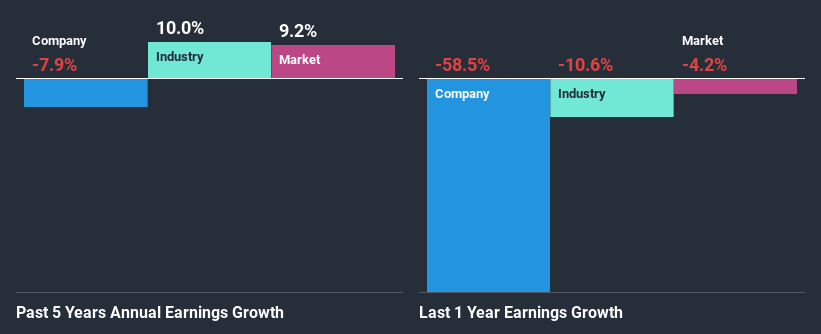- Denmark
- /
- Healthtech
- /
- CPSE:NNIT
NNIT A/S' (CPH:NNIT) Dismal Stock Performance Reflects Weak Fundamentals

It is hard to get excited after looking at NNIT's (CPH:NNIT) recent performance, when its stock has declined 8.8% over the past month. To decide if this trend could continue, we decided to look at its weak fundamentals as they shape the long-term market trends. Particularly, we will be paying attention to NNIT's ROE today.
Return on Equity or ROE is a test of how effectively a company is growing its value and managing investors’ money. In other words, it is a profitability ratio which measures the rate of return on the capital provided by the company's shareholders.
View our latest analysis for NNIT
How Do You Calculate Return On Equity?
ROE can be calculated by using the formula:
Return on Equity = Net Profit (from continuing operations) ÷ Shareholders' Equity
So, based on the above formula, the ROE for NNIT is:
6.7% = kr.76m ÷ kr.1.1b (Based on the trailing twelve months to December 2020).
The 'return' is the income the business earned over the last year. One way to conceptualize this is that for each DKK1 of shareholders' capital it has, the company made DKK0.07 in profit.
Why Is ROE Important For Earnings Growth?
So far, we've learned that ROE is a measure of a company's profitability. We now need to evaluate how much profit the company reinvests or "retains" for future growth which then gives us an idea about the growth potential of the company. Assuming all else is equal, companies that have both a higher return on equity and higher profit retention are usually the ones that have a higher growth rate when compared to companies that don't have the same features.
NNIT's Earnings Growth And 6.7% ROE
On the face of it, NNIT's ROE is not much to talk about. We then compared the company's ROE to the broader industry and were disappointed to see that the ROE is lower than the industry average of 12%. Given the circumstances, the significant decline in net income by 7.9% seen by NNIT over the last five years is not surprising. We believe that there also might be other aspects that are negatively influencing the company's earnings prospects. Such as - low earnings retention or poor allocation of capital.
That being said, we compared NNIT's performance with the industry and were concerned when we found that while the company has shrunk its earnings, the industry has grown its earnings at a rate of 11% in the same period.

Earnings growth is a huge factor in stock valuation. It’s important for an investor to know whether the market has priced in the company's expected earnings growth (or decline). This then helps them determine if the stock is placed for a bright or bleak future. Is NNIT fairly valued? This infographic on the company's intrinsic value has everything you need to know.
Is NNIT Using Its Retained Earnings Effectively?
NNIT's declining earnings is not surprising given how the company is spending most of its profits in paying dividends, judging by its three-year median payout ratio of 54% (or a retention ratio of 46%). The business is only left with a small pool of capital to reinvest - A vicious cycle that doesn't benefit the company in the long-run. To know the 3 risks we have identified for NNIT visit our risks dashboard for free.
In addition, NNIT has been paying dividends over a period of five years suggesting that keeping up dividend payments is preferred by the management even though earnings have been in decline. Upon studying the latest analysts' consensus data, we found that the company is expected to keep paying out approximately 51% of its profits over the next three years. Regardless, the future ROE for NNIT is predicted to rise to 15% despite there being not much change expected in its payout ratio.
Summary
Overall, we would be extremely cautious before making any decision on NNIT. Because the company is not reinvesting much into the business, and given the low ROE, it's not surprising to see the lack or absence of growth in its earnings. That being so, the latest industry analyst forecasts show that the analysts are expecting to see a huge improvement in the company's earnings growth rate. Are these analysts expectations based on the broad expectations for the industry, or on the company's fundamentals? Click here to be taken to our analyst's forecasts page for the company.
When trading NNIT or any other investment, use the platform considered by many to be the Professional's Gateway to the Worlds Market, Interactive Brokers. You get the lowest-cost* trading on stocks, options, futures, forex, bonds and funds worldwide from a single integrated account. Promoted
Valuation is complex, but we're here to simplify it.
Discover if NNIT might be undervalued or overvalued with our detailed analysis, featuring fair value estimates, potential risks, dividends, insider trades, and its financial condition.
Access Free AnalysisThis article by Simply Wall St is general in nature. It does not constitute a recommendation to buy or sell any stock, and does not take account of your objectives, or your financial situation. We aim to bring you long-term focused analysis driven by fundamental data. Note that our analysis may not factor in the latest price-sensitive company announcements or qualitative material. Simply Wall St has no position in any stocks mentioned.
*Interactive Brokers Rated Lowest Cost Broker by StockBrokers.com Annual Online Review 2020
Have feedback on this article? Concerned about the content? Get in touch with us directly. Alternatively, email editorial-team (at) simplywallst.com.
About CPSE:NNIT
NNIT
Provides information technology solutions for life sciences, public, and private sectors in Denmark, Europe, the United States, and Asia.
Good value with adequate balance sheet.
Similar Companies
Market Insights
Community Narratives




